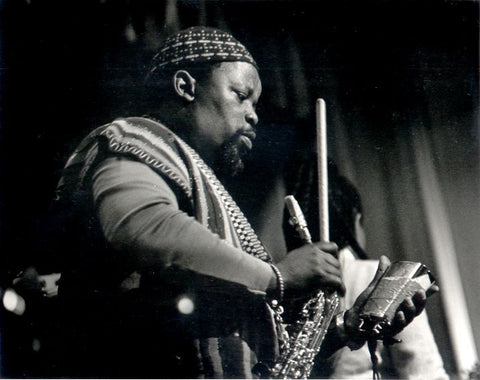Dudu Pukwana / July 18, 1938 - June 30, 1990
July 18, 2017

Happy birthday to one of my very favorites, the soulful saxophonist Dudu Pukwana , an exile from apartheid South Africa and a major contributor to the ’70s creative jazz landscape.
He started playing professionally in the ’50s with Kippie Moeketsi and Nik Moyake. Pukwana and Moyake became members (along with Johnny Dyani, Mongezi Feza and Louis Moholo) of the Blue Notes, a group led nominally by white pianist Chris McGregor, but were essentially a collective. They became a sensation for both the quality of their music as well as the fact that they were a mixed-race band, something that was illegal under apartheid. Routine harrassment led the band members to move to Europe.
Dudu not only played in McGregor’s Brotherhood of Breath band, but also with his groups Spear, Zila and the very fun Afro-rock band Assagai. He blows sax on “Funky Kingston” by Toots & the Maytalls, appears on my favorite Hugh Masekela album (Home Is Where The Music Is), plays on Matata’s super funky album, joins Don Cherry & John Tchicai in Dyani’s Witchdoctor’s Son group, made a couple of albums with John Martyn (one of which remains unreleased) etc etc.
His career stylistically included kwela, mbaqanga, bop, free jazz, afrobeat, prog, Brit-folk, rock, reggae and funk, making several appearances in concert or on record with groups like Centipede, Incredible String Band, King Crimson, ICP Orchestra, Gwigwi Mrwebi, John Stevens, Jonas Gwangwa’s African Explosion, Jabula, Gary Windo, Traffic, Eddie Quansah, Tunji Oyelana and many others.
Pukwana died before he ever got the chance to go back home. His sound is quite unique, mixing kwela and bop influences, and he could get really funky or blast searing free jazz. Check him out if you’ve never heard him.
